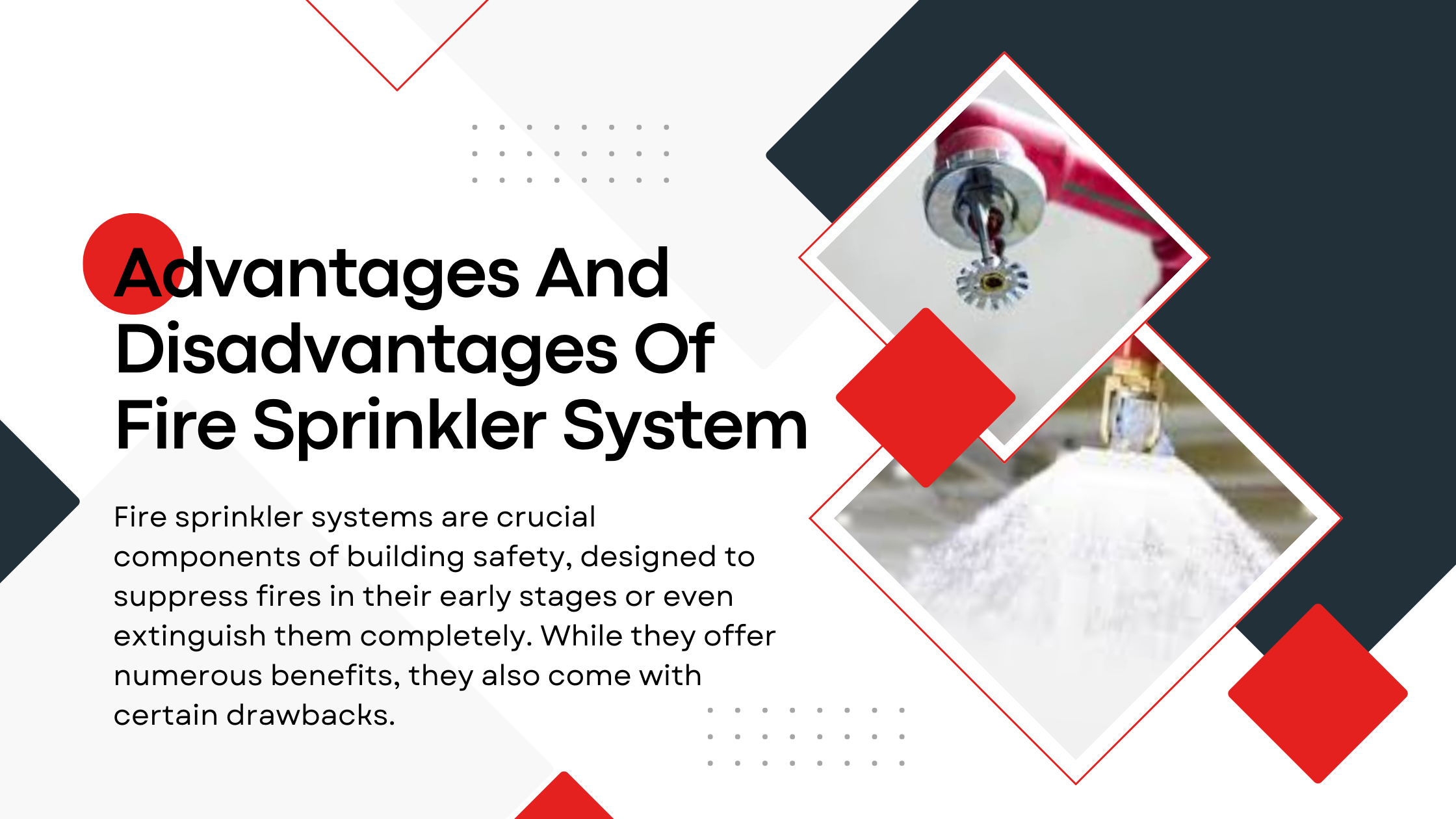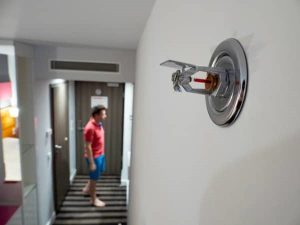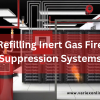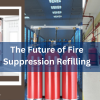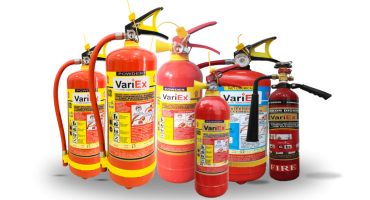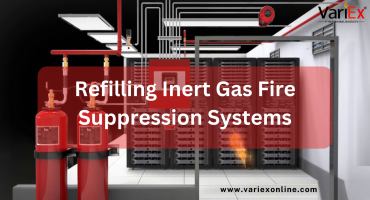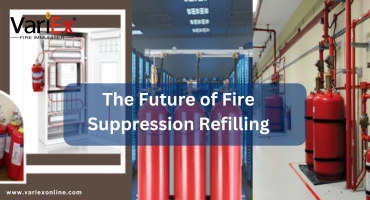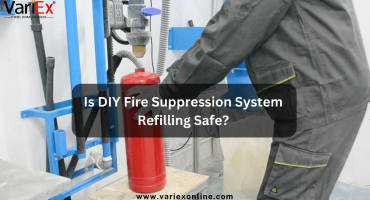![]()
Fire Immuniser
+91-7829629111
Email: info@variex.in
Varistor Technologies Pvt. Ltd.
Block-1, First Floor, Ardente Office One, Hoodi Circle, ITPL Main Road, Bengaluru, Karnataka 560048, IN
Advantages And Disadvantages Of Fire Sprinkler System
Fire sprinkler systems represent a cornerstone of modern fire protection strategies, offering a proactive approach to safeguarding lives and property against the destructive force of flames. These systems are designed to detect, control, and extinguish fires in their early stages, thereby preventing the escalation of emergencies and minimizing the associated risks. While their benefits are widely acknowledged, fire sprinkler systems also come with their own set of considerations and challenges. Understanding both the advantages and disadvantages of these systems is essential for informed decision-making in the realm of building safety and risk management. In this exploration, we delve into the multifaceted aspects of fire sprinkler systems, examining their strengths, limitations, and the broader implications they hold for occupant safety, property protection, and regulatory compliance.
Fire sprinkler systems are crucial components of building safety, designed to suppress fires in their early stages or even extinguish them completely. While they offer numerous benefits, they also come with certain drawbacks. Understanding these advantages and disadvantages is essential for making informed decisions about fire protection measures.
Advantages Of Fire Sprinkler System
- Effective Fire Suppression: Fire sprinkler systems provide rapid response to fires, dousing flames with water or other extinguishing agents. They can prevent the spread of fire and minimize property damage.
- Life Safety: The primary advantage of fire sprinklers is their ability to save lives. They can control or extinguish fires before they escalate, giving occupants more time to evacuate safely.
- 24/7 Protection: Fire sprinkler systems are always on standby, offering continuous protection against fire hazards. This ensures round-the-clock safety for buildings and their occupants.
- Minimal Water Damage: Contrary to common misconceptions, fire sprinklers typically use significantly less water compared to firefighting hoses. They target the source of the fire directly, minimizing water damage to the surrounding areas.
- Cost-Effective: While installation costs may be a concern, fire sprinkler systems can potentially reduce insurance premiums for building owners. Additionally, they can mitigate the financial impact of fire-related damages and disruptions.
- Compliance with Regulations: Many building codes and regulations mandate the installation of fire sprinkler systems, especially in commercial and multi-story residential buildings. Compliance with these requirements is essential for legal and insurance purposes.
Advantages of Fire Sprinkler Systems | Disadvantages of Fire Sprinkler Systems |
|---|---|
1. Effective fire suppression | 1. Initial installation cost |
2. Life safety | 2. Ongoing maintenance requirements |
3. Continuous protection | 3. Potential for false alarms |
4. Minimal water damage | 4. Concerns about water damage |
5. Cost-effectiveness | 5. Aesthetic impact |
6. Compliance with regulations | 6. Limited effectiveness for some hazards |
Disadvantages Of Fire Sprinkler System
- Initial Cost: One of the primary drawbacks of fire sprinkler systems is their upfront installation cost. This includes equipment, labor, and system design expenses, which can be significant for larger or more complex buildings.
- Maintenance Requirements: Fire sprinkler systems require regular maintenance to ensure proper functionality. This includes inspections, testing, and occasional repairs, which can add to the overall cost of ownership.
- False Alarms: Like any automated system, fire sprinklers can sometimes trigger false alarms due to environmental factors or system malfunctions. These false alarms can disrupt building operations and lead to unnecessary evacuations.
- Water Damage Concerns: While fire sprinklers aim to minimize water damage, their activation can still cause water-related issues such as mold growth, structural damage, and property loss, especially if not promptly addressed.
- Aesthetic Impact: Some building owners and designers may perceive fire sprinkler components as unsightly or intrusive, especially in settings where aesthetics are a priority. Concealing or integrating sprinkler systems into the building design can mitigate this concern but may incur additional costs.
- Limited Effectiveness for Certain Hazards: While highly effective for most fire scenarios, fire sprinkler systems may have limitations in controlling fires involving certain types of hazardous materials or extremely high temperatures. Supplemental fire protection measures may be necessary in such cases.
In conclusion, fire sprinkler systems offer substantial advantages in terms of fire protection and life safety. However, they also entail costs and considerations that must be weighed against their benefits. Ultimately, the decision to install a fire sprinkler system should be based on a thorough assessment of the building's needs, regulatory requirements, and budgetary constraints.
Frequently Asked Questions
- Fire sprinkler systems offer several advantages, including:
- Effective fire suppression
- Life safety for occupants
- Continuous protection, operating 24/7
- Minimization of water damage to property
- Long-term cost-effectiveness through insurance savings
- Compliance with building safety regulations
- Building codes and regulations vary by jurisdiction, but fire sprinkler systems are often required for commercial and multi-story residential buildings. Compliance with these regulations is essential for legal liability, insurance coverage, and occupant safety.
- While highly effective, fire sprinkler systems also have some drawbacks, including:
- High initial installation costs
- Ongoing maintenance requirements
- Potential for false alarms disrupting operations
- Concerns about water damage to sensitive areas
- Aesthetic impact on building design
- Limited effectiveness against certain fire hazards
- Fire sprinkler systems are designed with safeguards to minimize the risk of accidental activation. However, false alarms can occur due to environmental factors or system malfunctions. Regular maintenance and testing help to mitigate this risk.
- While fire sprinklers aim to minimize water damage by targeting the fire directly, their activation can still cause concerns, especially in sensitive areas. Proper system design and maintenance are essential to minimize the risk of water damage.
Final Say
At VariEx.in and VariexOnline.com, we specialize in supplying and installing top-quality fire fighting systems and equipment. From fire extinguishers to advanced suppression systems, we offer comprehensive solutions tailored to your needs. Our experienced team ensures precise installation and maintenance for optimal safety.
Trust VariEx for reliable fire protection. Contact us online or call 7829629111 to learn more.


